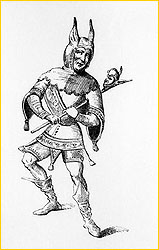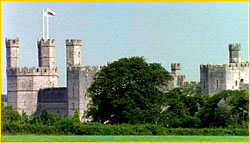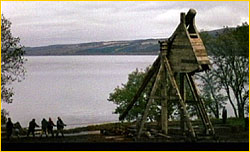 |
 |
Part 2 | Back to Part 1 NOVA: What about the role of women inside the castle? What were they doing day-to-day? Holmes: Well, by and large, and this is a very broad generality, women had a subservient role in medieval England. I say 'by and large' because there were some unusual examples. A lady named Nicola de la Haye, for example, was constable of Lincoln Castle. She actually held Lincoln Castle for King John during civil wars there. So she took on a warrior role very successfully. But usually the role of women was a subordinate one, with some flamboyant exceptions. A woman's duty was to take care of children. They were involved in cooking. They were involved in washing. If they were well enough bred, they were spared manual labor. A lady like Nicola de la Haye didn't spend all her time cooking and washing. She spent her time in more lady-like pursuits. Typically, for example, she did embroidery and that sort of thing, but for most women in medieval England, it was a life of hard manual labor.
Holmes: Well, there were diversions such as jesters, tumblers, and jugglers. Entertainment that was put on for the lord was seen by almost everybody within the castle social structure. These things might not seem much to us, but to medieval people, the prospect of a troubadour coming on the scene or a tumbler or jester who capered about would have been something to see. There were board games such as Nine Men's Morris. I'm not sure if anybody knows exactly what Nine Men's Morris was, but it probably was a game like modern solitaire. These were games that were played again to provide some relief from an otherwise pretty grim life. We know about some diversions because they were increasingly complained about into the 15th century. There were complaints about lewd games like football, some kind of game that involved kicking a ball about. The rules as they were may have been pretty American. Heads were probably being punched and people were being kicked. But because of the lewd game of football, the noble art of archery was being neglected. Certainly for the upper classes, hunting was both a pastime and an important source of food. And by hunting I mean in the English rather than the American sense. This was the pursuit of game on horseback. And falconry also was important. Hunting and falconry produced food for the castle. Fresh food, and fresh meat in particular, was very important in the winter. It was difficult to keep most of your cattle alive during the winter. Livestock got killed off and salted and the castle residents kept alive just as many as they needed to breed for next year. If someone was out and killed a hog, you could produce food for the winter that was better than the ground, porridgy food that most people ate every day. NOVA: Besides the meat, how did they provide for food in a castle? Were they self-sufficient? Holmes: Normally a castle had some provisions, but it also depended on the land around it. What you did if you thought a castle was going to be besieged was to deliberately stock it with food. You did that because one of the most common ways of bringing a castle down was not to knock it down, but to simply blockade it until people ran out of food. A sensible castle always kept a reserve of food. The real problem was what they ate in the winter. There were endemic food crises in medieval England as a result of which many people died. If you knew a siege was coming, you stocked up even more. In 1173, for example, Salisbury Castle thought it was going to be besieged so it stocked up with corn, wheat, bacon, cheese, beans, and salt. Interestingly, it also stocked up with a lot of malt to make beer. NOVA: Beer. Was that to relieve the inevitable fear that arose during a siege? Holmes: Beer, which was later called small beer, was pretty non-alcoholic. They wanted it because it made suspect water drinkable. So the garrison of Salisbury very sensibly got the makings for beer by making malt. Now, that clearly tells us that they must have had somebody in the garrison who was a brewer, who was capable of turning that into beer. The food they ate in a castle makes up a pretty interesting list. Wheat to make bread, and then bacon, cheese, beans, and salt. That's the sort of military menu that would have been familiar to soldiers of many generations. In fact, a siege had a leveling effect. People who were used to eating rather well or eating with variety found themselves reduced to eating very badly in a siege. So getting caught in the castle during the siege was no joke if you were a lady or lord.
Holmes: It's almost axiomatic to say that if you were a lord you didn't want to get caught in your castle when it was besieged. Being in the castle was decidedly uncomfortable as time went on. If the castle fell, then at the very best you had the disagreeable question of ransom. At the very worst, you found yourself getting strung up by an enraged victor. If you were the lord and outside the castle, you could raise troops or exercise your political role. You probably left the constable and his garrison to the sordid task of defending the castle and you tried not to get bottled up in it yourself. NOVA: So the garrison and all the supporting cast, they were left behind. What was life like for them when the siege started? Holmes: They tried to get the place as well provisioned as they could before the siege started. And very often in the circumstances in medieval England you would know whether things were going to go pear-shaped or not. But, of course, the first thing that happened was that you lost communication with the outside. And women and children were often inside as well. The whole question of what to do with what were called "useless mouths" arose because women and children were clearly going to eat rations, but they wouldn't be of much use for the castle's defense. So there was much to be said for trying to get the garrison free of useless mouths at the last moment so that there wouldn't be people who were eating up the rations without actually contributing to defense. In an ideal world, what you wanted to do was to get the castle well stocked up, and to get women and children out before the besiegers closed in around the castle.
Holmes: It could. But a siege was often avoidable. As a constable, you almost certainly came to some arrangement with your lord as to what to do when a siege began. There was often surprisingly little enmity between attacker and defender. The constable would be talking to another man of his own social class on whose side he may well have fought in a previous war. He would say: 'Look, I have to hold the castle for my lord or on behalf of the king. I cannot let you have it now, but if he has not brought me relief within 30 days, I will surrender at the gates.' And that was a very common deal which got everybody off the hook, in a way. It meant the besieger didn't have to try very hard to get in and wouldn't have to damage the real estate, which was in nobody's interest. If your master didn't relieve you in 30 days, you then surrendered. And very often that sort of deal was accepted and the garrison was allowed to march out with what later became known as the "honors of war." That meant they could bring out a bag of their personal belongings. They carried out their weapons and they were treated honorably. NOVA: So that's the least bloody of all the alternatives, really. Holmes: Yes, and it happened quite a lot. Danger came if you decided to hold on to the last. If getting an honorable capitulation was the easiest, holding on to the end could spell real trouble if the castle fell. In 1224, for example, Bedford Castle was besieged by King Henry III and the castle garrison made a very, very gallant defense. Bedford Castle held out against the entire military resources of the kingdom. It held out for eight weeks. Eventually the place was taken by a huge mine set under the keep. The keep sank in its foundation and the garrison surrendered and the constable and all the senior men in the garrison were strung up outside. They had gone on longer than might have been considered reasonable, and that's what could happen. NOVA: What was the fate of women and children in such a situation? Holmes: They might get killed by starvation or by damage to the castle. But I know of no instance of women being deliberately killed when the castle was taken. That would have been regarded as being the sort of thing that you certainly didn't do in this society. Photos: (1-3,6,7) WGBH/NOVA; (4) British Library, further reproduction prohibited; (5) Bettman/Corbis. Medieval Arms Race | NOVA Builds a Trebuchet | Life in a Castle Destroy the Castle | Resources | Transcript Medieval Siege | Pharaoh's Obelisk | Easter Island | Roman Bath | China Bridge | Site Map Editor's Picks | Previous Sites | Join Us/E-mail | TV/Web Schedule About NOVA | Teachers | Site Map | Shop | Jobs | Search | To print PBS Online | NOVA Online | WGBH © | Updated November 2000 |
 Lords and ladies rarely had to do any manual labor in the castle.
Lords and ladies rarely had to do any manual labor in the castle.
 Jesters would visit a castle to entertain both commoners and nobility.
Jesters would visit a castle to entertain both commoners and nobility.
 Attackers and defenders often tried to avoid the destruction of a castle.
Attackers and defenders often tried to avoid the destruction of a castle.
 A trebuchet—such as the one that NOVA built—would only be launched if a castle resisted.
A trebuchet—such as the one that NOVA built—would only be launched if a castle resisted.